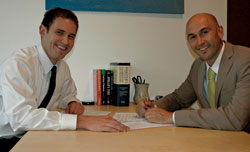Solar Powered Lawyers
Creating New Markets in a Troubled Economy
 Sean Conway ’09, left, and Yuri Horwitz ’06 |
When the credit crisis hit Wall Street last year, financing for big and small energy projects alike hit major roadblocks. Yuri Horwitz ’06 had firsthand experience with these problems as a renewable energy lawyer, and he was determined to help solar energy overcome this financial hurdle.
Horwitz is the co-founder, President, and CEO of Sol Systems, a Washington, DC based solar energy financing and development company. “The mission of Sol Systems is to serve as a bridge between the renewable energy and traditional energy sectors with the end goal of making solar energy more affordable,” says Horwitz.
Horwitz founded Sol Systems with George Ashton, who serves as Vice President and CFO of the company. “The financing solutions we offer our customers have a substantial impact on their decision to purchase solar energy” explains Ashton.
Sol Systems helps customers finance the purchase solar generation systems, in part, through the monetization of solar renewable energy credits. Solar renewable energy credits are tradable commodities that represent the green attributes associated with solar energy production. Many states now require electricity retailers to include a certain percentage of solar generated power within their overall electricity portfolio or pay a hefty fine.
Sol Systems has partnered with solar panel installers to buy solar credits directly from homeowners and small businesses, allowing the company to provide electricity retailers with a large-scale solar credit supplier they can trust.
“What makes this so exciting is that Sol Systems is helping to make solar energy affordable for people all over the country who only two years ago could not take advantage of this subsidy,” says Horwitz.
When Horwitz founded Sol Systems in 2008, the company was virtually alone in the industry, effectively creating the solar credit markets in states such as Indiana, Ohio, and Virginia. While competitors have materialized over the past year, Sol Systems remains the largest solar credit aggregator, an important position in a market that is estimated to grow to $1.4 billion in the next 10 years.
With sales reaching over $5 million in a little over a year, Horwitz recently left his job in the renewable energy practice at the law firm of Alston and Bird, LLP in Washington, DC to focus his attention on Sol System’s expansion. Leaving the traditional practice of law does not mean Horwitz no longer considers himself a lawyer, however.
“Whether it involves drafting a contract with an installer or interpreting a new state regulation, I could not have started this company without my legal education,” says Horwitz.
It was for this reason that Horwitz looked to a Law School graduate when he expanded his staff this fall. Sean Conway ’09 began working with Sol Systems this summer while he waits to start as an associate with Akin Gump Hauer Strauss and Feld LLP next year.
“Like many members of the Class of 2009 I had my start date deferred due to the slow economy,” says Conway, who was a teammate of Horwitz’s on the Men’s Track Team at the College of William and Mary where both earned their undergraduate degree. “I looked at my deferment as an opportunity to gain practical business experience with an environmental company, and my work with Sol Systems has exceeded my expectations.”
Conway credits the socially conscious legal work in a business setting as a top reason for his happiness at Sol Systems.
“In my first week at the company I was drafting comments for a state rulemaking proceeding one day and speaking with solar panel installers about problems on the ground the next,” says Conway. “It is an interesting mix of responsibilities that I do not think I could have found anywhere else.”
It does not appear that the work will slow for Sol Systems, either. The company currently operates in nine states, including Delaware, Indiana, Maryland, New Jersey, North Carolina, Ohio, Pennsylvania, Virginia, and Washington, DC, and Horwitz plans to expand to a number of other states in the upcoming months. In addition, Sol Systems recently began to expand its financing options available to potential solar customers, enabling more customers to take advantage of solar energy while diversifying the company’s business portfolio.
“Our end goal is to get as many systems in the ground and running as possible,” says Horwitz.
With a pair of Virginia Law educated lawyers working to make this happen, the future is looking bright for the solar energy.




